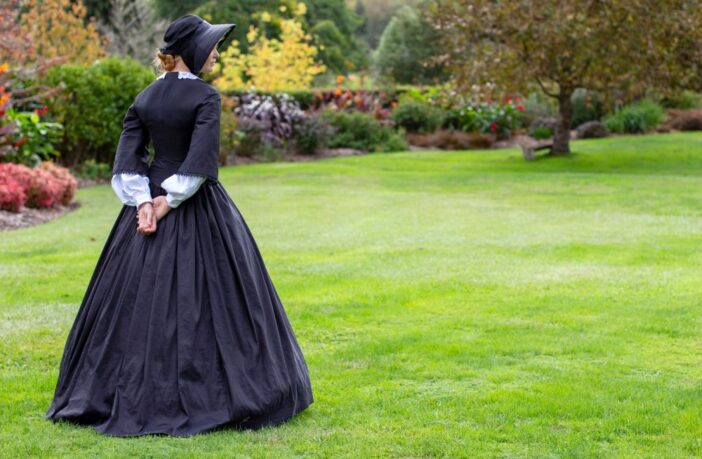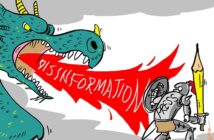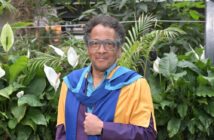While the second series of the BBC podcast “Lady Killers” continues to entertain audiences with its feminist take on 19th and early 20th Century murderesses, we spoke to the academic consultant on the series – billed as the programme’s ‘resident historian’ Professor Rosalind Crone from The Open University.
Murder most horrid sells. And when you find history is in the mix it has even more appeal because it draws people in – connects the past with the present and gets people thinking.
That’s the view of Rosalind Crone, a professor of history specialising in criminal justice, society and the culture in Britain during the ‘long’ 19th Century. She is also the historical brains behind Lady Killers, available on iPlayer.
And it has just been announced that it will be returning for a third series with The Open University becoming a co-producer alongside the programme’s makers, production company Storyhunter.
The podcast looks at the killings committed by women in that period, when women’s rights were minimal; when females were expected to act in a certain way; and when women had limited control over financial affairs and even their own children.
The case studies which Rosalind helped to choose and research for the series showed how femininity worked both for and against women standing in the dock, and so much more.
Some are well known, but Rosalind’s contribution has focused on bringing unknown cases to public attention, stories that reveal something important about women’s lives in the 19th Century.
And she had plenty of material. She used to be the OU’s director of the Centre for the History of Crime, Policing and Justice, yet research on some case studies simply started as the result of a mere mention in a book and involved going back to basics, or ‘shoe-leather’ research in archives at home and abroad.
Cases in the series include 1920’s “New Woman” Edith Thompson whose conviction for murder on the flimsiest of evidence is under review 100 years later; tavern keeper Mary McKinnon who faced a trial that largely dismissed the testimonies of sex workers; backstreet abortionist Elizabeth Taylor; and Margaret Garner, an enslaved woman who killed her own daughter to prevent her having a lifetime of servitude in every way.
With an all-female line up, the series, which was in the top ten most popular BBC podcasts in 2022, is presented by historian Lucy Worsley. Rosalind features on air in many episodes alongside various other professionals including lawyers, psychologists, activists, comedians and barristers.
It’s not the first time she’s worked with Lucy as they both appeared in the BBC programme ‘A Very British Murder’ in 2013. That included fictional and also real-life murders, some of which were infamous, and revealed how they were consumed by the public and decision makers.
She has also appeared in Expert Witness, where she shared her knowledge about poisoning and arsenic in Britain during the 19th Century in a case about toxicology.
In Lady Killers, Rosalind helps us look through the lens of what society was like at the time for women. She reveals her understanding of why some women killed in the 19th Century, how they were viewed by men and what constraints were put upon them that might have forced them to travel their murderous path.
With the almost exclusively female team at StoryHunter, the production company behind Lady Killers, she explored themes such as pregnancy outside wedlock; married life; abortion; domestic violence; post-natal psychosis that led to infanticide; finances and women who worked.
Rosalind, who is now head of the OU’s History department, said:
“During the course of that research, using criminal justice records, you start to open up interesting corners of women’s lives in that period.
“They provide a unique window into ordinary lives that you wouldn’t otherwise get. It’s a series about killing, but more importantly, about living. The killing provides an opportunity to explore women’s lives.”
She said she is able to dip into areas of life that the public wouldn’t have thought about and then to “use the past to think more critically about our present”.
“By reaching out to the past and bringing in something quite new and fresh and different often gives us a new perspective on an issue in the present,” she said.
Ultimately, the stories provoke an on-air debate by the panel on whether women’s lives have changed much over the past 100-200 years.
It’s a fascinating look into many aspects about being a 19th Century woman: when their femininity works in their favour whilst in the criminal justice machinery, or when it doesn’t; what class you are from and how you might be demonised (or not) for that and, lastly, race.
Rosalind said: “There is no doubt that in the hundred years since 1923 the lives of women in Britain, North America and Australia have experienced further dramatic change, sustained by unprecedented legislative achievements. However, there remains much work still to do, not to mention great uncertainty. Studying these cases from the past can help us to find a way forward for women in the future.”
- The Centre for the History of Crime, Policing and Justice was started by the late Professor Clive Emsley and for many decades now has had a unique strength in the history criminal justice.
- Discover more about Professor Crone’s work, including on Victorian popular culture, the history of crime and policing, and the history of prisons and prison education.
- You can listen to the entire new series of Lady Killers first on BBC Sounds in the UK or weekly wherever you get your podcasts.
Picture credit: KathySG for Shutterstock



